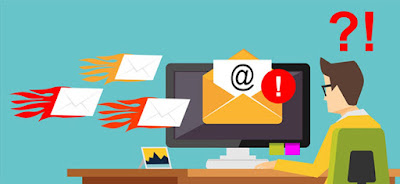WHAT IS EMAIL BOMBARDMENT?


There are more and more people dedicated to violating websites, email accounts, accounts of different platforms such as Facebook and finally. The security that we must have in all our actions on the Internet must be considered vital so that our projects, accounts and especially our personal data are not affected.
This time practical but very useful advice when it comes to safely browsing the Internet
10 GOLDEN RULES OF INTERNET SAFETY
Remember
that when browsing the web or using online services, security is essential to
protect our data and avoid the theft of information or major problems.
RULE 1: YOU NEED TO USE A VPN OR
PROXY TO BROWSE ANONYMOUSLY
If we do not
want to leave our mark on the Internet, one of the safest ways is through a
virtual private network or through a proxy server that acts as an intermediary
in communication with the website we visit.
RULE 2: DO NOT SHARE OUR BANK DETAILS
Many
computer attackers see the perfect loot in your bank details, so it is
necessary not to provide your banking information on the internet under any
point of view, except in the case that you already know the seriousness of a
company, its reputation and its experience, because perhaps you have to make an
acquisition. However, it is better to use secure payment platforms such as
PayPal.
RULE 3: BE CAREFUL WHEN BROWSING FROM
YOUR MOBILE
If you are
already taking the appropriate precautions when browsing from your desktop or
laptop PC, do not forget your mobile, because it is very important that you
take into account the same rules for this case. Through devices such as
smartphones, the owners of others are more likely to violate security elements
that may be provided by your operating system.
RULE 4: CLEAR COOKIES
A cookie is
a file created by a website that contains small amounts of data and that is
sent between a sender and a receiver, in order to know the user's preferences
and facilitate their experience on the site. However, the information that is
shared is likely to reach third parties, so it is advisable to assess the
traffic of this data and in any case from the browser we can decide to delete
these cookies to avoid unnecessary scares.
RULE 5: RESTRICT YOUR INFORMATION ON
SOCIAL NETWORKS
All the
information we upload to social media is in the public domain, even though we
supposedly share it for a certain friends area. If we share unnecessary data
such as home addresses, phones, emails, we are exposed to many dangers, so use
social networks responsibly to avoid blackmail or worse.
RULE 6: CREATE STRONG PASSWORDS FOR
EACH OF YOUR ACCOUNTS
By creating
a secure password you will prevent someone from accessing your mail, social
networks or user accounts of the online services that we normally use. As we
know many of them link data from your mobile phone or bank cards, then it is
essential to create passwords that nobody imagines them. I give you a tip:
create a password between numbers, lowercase and uppercase letters, keyboard
characters, space bar, in short; but never with something that has to do with
your name or the name of a relative or the workplace or something that
surrounds you. Then copy it by hand into a physical notebook, always have it at
hand and from there type in your online accounts. So you will have all the
security in the world.
RULE 7: DOWNLOAD FROM SECURE WEBSITES
On some
occasions we have had the need to download an important document or program
that we want or that we suggest, so we must find out the origin of the website,
its reputation to have the confidence to do so. This way we make sure we are downloading
the program really what we want and not some software that seeks to hack us.
RULE 8: OPEN LINKS FROM KNOWN SOURCES
When we open
links from unknown sources, the chances of our computer being infected are
almost 100%, that is why we must avoid opening links from internet forums, chat
forums, platforms such as Facebook, among others. We always try to open links
from known sources. You can tell when a site has a good reputation or not, from
its design.
RULE 9: FREE PUBLIC WI-FI ZONES ARE
OFTEN UNSAFE
The same smartphones detect when a connection is not secure and warn us, so it is preferable to use our own data if we really want to do an action or better if we have our device well stored. On many occasions we only take it out because we find ourselves doing nothing and looking at what others are publishing, as I suggest you hold on until you find a safe Wi-Fi area or get to your work or home.
RULE 10: ALWAYS USE AN ANTIVIRUS
If you
inadvertently opened an unfit link and a virus that puts your computer at risk
immediately entered the network, then let me tell you that you are in trouble.
To begin with and when installing your operating system on your PC or
Cellphone, you must immediately hire an antivirus service, or at
least one free, and thus avoid being a victim of information theft or much
worse. If you are already infected, there are some antivirus programs that
can help you eliminate damaged files, but this is not always the case.
So now you
know these 10 golden rules to stay virus-free and as safe as possible on the
Internet.
Comments
Post a Comment